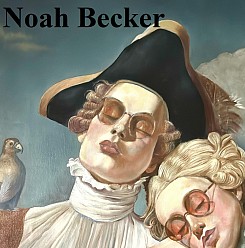Whitehot Magazine
January 2026
"The Best Art In The World"
"The Best Art In The World"
January 2026
“Friends to Weirdness” – Interview with Jeffrey Grunthaner

The Trouble with Sundays (screenshot)
By WILLIAM LESSARD January 28, 2024
Jeffrey Grunthaner is a writer, artist, and curator based in Berlin. With Kenji Siratori, he is the author of Paracelsus’ Trouble With Sundays, a collection of hybrid poems and images, published by Posthuman Magazine in December 2023.
What was it like working with Posthuman Magazine?
It’s been great! It’s hard to find a publisher willing to back a glitched-out poetry / art book hybrid that does cheeky things with language. What happened was I dropped a poetry pamphlet, Aphid Poems, with an LA-based publisher called The Creative Writing Department. And Kenji Siratori, a publisher based in Japan, was one of the people who happened to heart my work when they posted about it on Instagram. I looked up his page and saw he had an open call for a glitch poetry anthology, so I reached out to see if he'd be interested in publishing my book.
Kenji ended up sort of amplifying what I sent him—adding surrealistically-inspired images that visually recreate the syntax and themes embedded in my text. I think they do a lot for the book. Ultimately, what started as a solo endeavor became something of a collaborative performance.
Publishing with Kenji has also turned me onto a part of the Internet which I was previously unaware of. Writers devoted to hybridity, friends to weirdness, and who even hold seances with the specters of the avant-garde.
When did you start making these pieces?
I started making them in graduate school. I went to Brooklyn College and took classes with people like Ben Lerner and Vito Acconci. Language poetry and strange, alternative forms of design were very much in the air.
The whole project is kind of about the imagination rupturing the real: reality transmogrified by dreams, automation, and direct encounters with the unconscious.
A lot of the methods I used to generate the poems still work for me in other contexts. But I haven’t written visual poetry in this vein for a number of years.

The Trouble with Sundays (screenshot)
What do you think of Hito Steyerl?
This is the first I’m hearing of her! Her video work seems cool; maybe a little more topical than what I’m about. Media like the film Robocop comes closer to touching on the actual wellsprings of my inspiration. The “ghost in the machine;” humanity struggling to liberate itself from the weaponized corporate body that’s been imposed on it.
While technology features prominently in my book, I’m not trying to speak to or critique it in any way. It’s more like an artifact drawn from everyday life, which I was able to “weirdify” by way of imaginative transformations.
That blocks of text become glitched is not so much a result of the breakdown of a technological system, as a kind of alternative reality imaged at the cusp of technological breakdown. If there was anything I was critiquing, it was the medium of the book itself: the book as commodity, as a "hot" medium. I wanted to mix the analogue with the digital: sentences and phrases as printed, with sentences and phrases as represented through an image.
 The Trouble with Sundays (screenshot)
The Trouble with Sundays (screenshot)
I see Leonora Carrington, I see Magritte, I see Ernst. Is the surrealist text having yet another moment?
I don’t know if it’s having a moment, but surrealism is important to me—particularly so when I was developing what became Paracelsus’ Trouble With Sundays. In my opinion, a lot of the more interesting poets working today have a surrealist edge about them.
Among the artists you mention, Max Ernst definitely influenced how I generated some of the poems in the book. Several pages can almost be considered frottages of their original source text.
 The Trouble with Sundays (screenshot)
The Trouble with Sundays (screenshot)
Agree or disagree: AI is going to kill all of us.
Disagree. Everyone seems so crestfallen over the fact that these algorithms playact the entropic dramas of our embodied sentience. Not to sound glib, but do you ever think a sequence of code might be haunted? Do you ever wonder if a deceased person’s email might be stained with psychic residue of its former user? To put this another way, and this is my personal take on the matter, AI can’t “kill us all” any more than the ghosts haunting former Civil War battlefields can influence propaganda.
How has being an art critic influenced your practice?
You know, I don't consider myself an art critic. I'm more of an art writer. But I think the imposition of deadlines has influenced how my writing has evolved. I tend to write very quickly, and I take no issue with working on several projects at once.
It’s possible that, through my art writing, my relationship to visual art has led me to consider things that poets (and writers more generally) tend to ignore. I think I’m also more aware than most that a poem—and this might apply to visual poetry especially—can simultaneously indicate a thing and transcend it. This isn’t an attitude of irony, so much as something like “significant form,” where the context that words and images enter into warps their literal meaning. And I like to think that the textured realms of signification inhabiting Paracelsus’ Trouble With Sundays point to exactly what they mean, and the opposite. WM
William Lessard
William Lessard is Poetry & Hybrids editor at Heavy Feather Review. His work has appeared in American Poetry Review, Beloit Poetry Journal, Best American Experimental Writing, Fence, and Southwest Review. Read more of his work at: williamlessardwrites.net.
view all articles from this author









